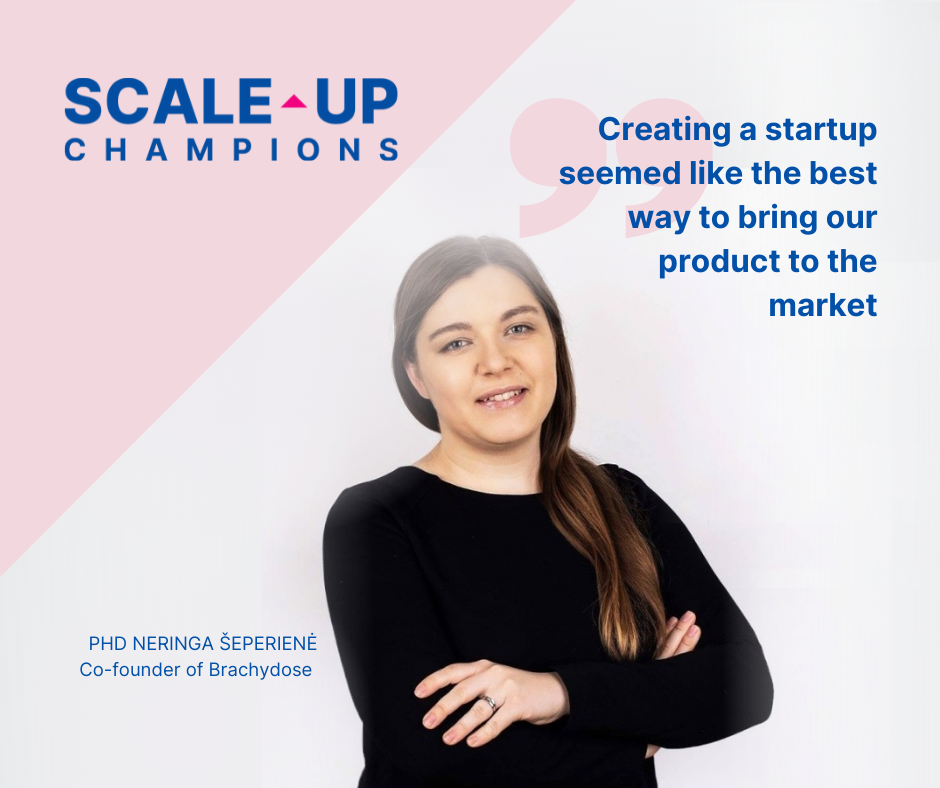Co-founder of the cancer treating tool: “Creating a startup seemed like the best way to bring our product to the market”

The new generation cares a lot about the environment they live in. They are not passive watchers but active actors who create an impact on the world. There are so many talented inventors who dared to take the first step and then caught success.
One of those changemakers is BrachyDOSE a MedTech startup from the Baltics. Four years ago they created a tool to measure radiation dose applied to patients during radiotherapy procedures. These new technology-based real-time measurements provide 10 times more data to assure the treatment without errors.
PhD Neringa Šeperienė, co-founder of the startup reveals that the strongest point of success is connections. According to her, the network of partners is growing very fast and the international programs for startups were quite important for this process. One of the biggest worldwide projects, Scale-up Champions helped them to find new contacts at hospitals in Denmark and look for new perspectives.
International programs help to move faster
Neringa Šeperienė remembers the beginning of the startup. The idea of BrachyDOSE came from the team's previous projects with hospitals and work experience as medical physicists.
„We were discussing ways on how to bring our product to the market and the “startup way” seemed the best route for us. The first and one of the most important things was to create a strong team of co-founders and advisers. Then we focused our attention on the development of the prototype of the product and tested it at the National Cancer Institute of Lithuanian. At the same time we started participating in hackathons and various collaboration programs and learned a lot about growing our startup”, says N. Šeperienė.
According to her, the active participation in local and international accelerators and programs allowed them to attract the first investments. They pitched their MedTech idea for a jury of Practica Capital at Life Science Baltics conference and won the special prize. They also became the winners of the first Kaunas startup accelerator. The valuable experience was at the Scale-up Champions Demo Day where the team got much-needed advice to improve the pitch as well as the business plan.
“In our case, all the CV's we were targeting were generous with their feedback and advised us what to do next, how to prepare for funding, what they expect from a MedTech startup. The most valuable tips and tricks for us were the preparation of a tailored version of the pitch for different audiences and practicing it with different people”, says N. Šeperienė.
She says that participating in those programs gave them a financial push to develop MVP (Minimum Viable Product), connected them to international networks, and prepared them for business.
From the Baltics to Denmark
A startup is a fast-growing business. It means that a startup can not drift in one market and must scale abroad. Co-founder of BrachyDOSE says that in previous years the international project Scale-up Champions was like a huge playground for their deep-tech startup to look discovering new markets.
According to her, this project created an opportunity to choose one of three ways to enter the market in Spain, Poland, Denmark, and Estonia. One way was to participate in the Startup-Corporate collaboration program and find new clients abroad. The second way was to join the Investment Readiness program, learn how to reach investors in the chosen market, and attract investments. The third one was discovering a new market in the Market Discovery Mission program.
“We are targeting the Baltic countries, Germany and France markets - hospitals, cancer treatment centers where radiotherapy is provided. But BrachyDOSE is placed in Kaunas Science and Technology Park which is a partner of the Scale-up Champions program. That’s why we decided to seize the opportunity and discover the Danish market too”, – shares her thoughts N. Šeperienė.
She says that in The Market Discovery Tour program BrachyDOSE found the Europe Horizon consortium in Denmark which invited them to apply for a project with them. Also, they got great contacts from clinical trials institutions and soft landing providers in this country. The Investment Readiness program was very helpful in preparing a pitch for investors.
“The program encouraged us to review our business plan and market entry strategy and widened our understanding of small markets and their entry strategies. We were lucky to meet amazing mentors at the “Scale-up champions” project who helped us to prepare needed materials for startup profile, review business plan and to do return on investment, revenue, manufacturing expenses calculations”, says N. Šeperienė.
She says that usually it is really hard to enter new markets individually and the international markets where you can meet the “right” persons and find new contacts are really important. Scale-up Champions helped to enter the foreign market faster.
Collecting 10 times more data for analysis
According to Neringa Šeperienė, radiotherapy is done in 151 countries high health care quality countries based in the EU as France and Germany. That is the reason why BrachyDOSE is targeting Baltic countries, Germany, and France markets. Developing countries are the hardest to enter because they are capable of adopting only the basic equipment.
“We select the markets using the following criteria: is there radiotherapy procedure available, is the market capable of adopting new solutions in upcoming 1-3 years, are there any specialists working with real-time measurement in radiotherapy field, competitive environment, national regulations and laws who helps us to adopt innovative solutions”, - says N. Šeperienė.
BrachyDOSE solves the lack of real-time patient data problem. Lack of data causes treatment uncertainties, and errors and increases overall treatment costs for hospitals and radiotherapy departments. A tool created by BrachyDOSE collects 10 times more data and provides it for medical professionals to see the predicted and the actual treatment. This set of data helps to tailor upcoming treatments and prevent errors, reduce expenses, and the time spent on the preparation and execution of quality control procedures.
